The Brain Bank was founded by Sarah Fox in 2011 as a distraction from PhD life and as a place to practice untangling the complexities of science for a general audience. Since its humble beginnings, the Brain Bank has flourished and is now a hub for science communication across the North West of England. We are proud to host a number of academics and budding writers and are also keen to offer support and training for anyone who is interested in trying their hand at science writing. If you would like to propose an article for the Brain Bank we would love to hear from you – you can tweet us @brainbancmanc or e-mail us [email protected]
Meet the Brain Bank Team:
Founder and regular contributor: Dr. Sarah Fox (@FoxWoo84)
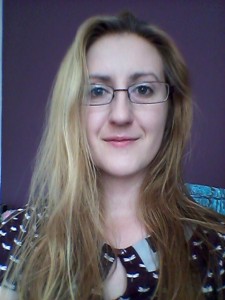 Tell us a little about your work: I received a PhD in neuroscience using mathematics and computational techniques to measure the way information flows across the brain in the hope of developing an early diagnostic tool for Alzheimer’s disease. Continuing my love of all things brainy I followed this work with a postdoc exploring how sensation (for me this was the sense of touch) is coded and interpreted by cells in different regions of the brain – the ultimate goal of this work being to decode the brain’s language with the hope that, in the future, we might have a brain-cell dictionary to help understand neuronal communication and importantly what happens when things go wrong. I have recently merged my passion for research and public engagement in a job where I help researchers and the lay public work together to design and implement co-produced health research.
Tell us a little about your work: I received a PhD in neuroscience using mathematics and computational techniques to measure the way information flows across the brain in the hope of developing an early diagnostic tool for Alzheimer’s disease. Continuing my love of all things brainy I followed this work with a postdoc exploring how sensation (for me this was the sense of touch) is coded and interpreted by cells in different regions of the brain – the ultimate goal of this work being to decode the brain’s language with the hope that, in the future, we might have a brain-cell dictionary to help understand neuronal communication and importantly what happens when things go wrong. I have recently merged my passion for research and public engagement in a job where I help researchers and the lay public work together to design and implement co-produced health research.
What is your geekiest secret?: I must admit I have a fair number of ‘geeky’ secrets. But probably one of the most embarrassing is that I’m a big fan of anime and manga (Japanese cartoons and comics) and have been to a few parties/conventions in cosplay (look that one up!). I like to think I have been careful enough to ensure no pictures exist, but you never know there may be some very embarrassing snaps lurking out there in the either.
What do you like to do when you’re not in the lab?: I’m the type of person who always likes to be busy, so I keep myself occupied with a fair number of hobbies, ranging from crocheting to cycling. However my favorite ‘out of lab’ activity, other than writing, is hiking and I take every opportunity I can to take myself away somewhere green.
What is the most exciting aspect of your research?: Like so many scientists, I’m attracted to the possibilities inherent in working at the edge of our understanding. I like the almost romantic notion that every stone we turn adds to the jigsaw of current knowledge. Although the thrill of new discovery is often balanced by the frustration of attempting to make sense of these discoveries, the way the knowledge unfolds is always a very exciting process!
Regular contributors:
Megan Barrett @Meg_an12
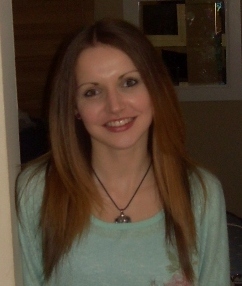 Tell us a little about your work: I work as an Editorial Assistant for a Medical Communication company, so I spend my day reading and editing scientific manuscripts, PPT slide presentations and congress abstracts. I also take care of submitting these to journals and congresses – hopefully with a positive outcome!
Tell us a little about your work: I work as an Editorial Assistant for a Medical Communication company, so I spend my day reading and editing scientific manuscripts, PPT slide presentations and congress abstracts. I also take care of submitting these to journals and congresses – hopefully with a positive outcome!
What is the most exciting aspect of your work?: Probably the variety. The materials I get to edit cover a range of scientific topics, from oncology to neuroscience, and I often get to read about new research and findings occurring in these areas.
What do you like to do when you’re not working?: Fortunately for my job, I love reading, though I don’t always have a huge amount of time to read things that are ‘non-scientific’! I also enjoy pilates, writing obviously and like many other people, going out with friends.
What is your geekiest secret?: I wouldn’t say it’s a secret but I did spend my 21st birthday with a mate at the Natural History Museum in London. Granted, I also went out later but I do like a good museum.
Dr. Christina Ferreras:
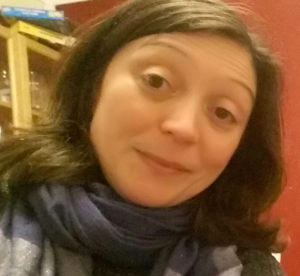 Tell us a little about your work: I am a postdoctoral scientist working in The University of Manchester. During the last 5 years I have been working in ovarian cancer, we are interested in cancer angiogenesis and why some patients benefit for some treatments and why others don’t and with that being able to find new alternative treatments.
Tell us a little about your work: I am a postdoctoral scientist working in The University of Manchester. During the last 5 years I have been working in ovarian cancer, we are interested in cancer angiogenesis and why some patients benefit for some treatments and why others don’t and with that being able to find new alternative treatments.
What were your favourite subjects at school and why?: My favourite subjects at school were biology and chemistry and actually I did my degree in Chemistry back in Spain. My biology teacher in high school was very inspiring he was one of those teachers that amused you with his questions and enthusiasm, always very committed with us and the biology and always trying very hard for us to like the subject; and I loved chemistry, that was for me the idea of a scientist when I was little, being in a lab wearing a lab coat and mixing different things and wait for a colour change, density, temperature, I loved it!
What first attracted you to science?: I always have had an inquisitive mind and back in high school I found amazing how the body works, the machinery from RNA to DNA which genes are expressed and not and what could happen with just one gene is not expressed, all those body pathways interconnected, the memory of the immune system once they have been presented to the antigen, I just wanted to know more and more about everything
What is your geekiest secret?: I am a super fan of the X-files series
What do you like to do when you’re not working?: I have quite a lot of hobbies, I like to keep me busy, I like running I always try to run one or two 10k per year, although I have to say I never run if it rains which makes it more challenging! I like baking, I love it but I am not sure if I am as good as I would like to. I also spend a lot of time with my children, going to the park or riding on a bike! and I love playing piano. And when the weather gets better I will start my little vegetable garden I love to be able to eat my own lettuce, cucumbers and tomatoes, not enough to make profit though J
What is the most exciting aspect of your work?: Being in the lab doing experiments it is what I like the most. I like thinking and asking questions the ‘why’ this or that and also to have the tools to be able to address those questions, I also like the variety, the fact that is not boring and that you learn new things every day or week
If you weren’t an academic what type of job do you think you would have?: I have been always interesting in how the mind works and for a while when I was little I was inclined to study to be a psychiatry, that along with working with animals on a zoo probably would have been a second choice instead of science
Dr. Nathan Green
 Tell us a little about your work: I’m a statistician and mathematical modeller. What this means is that I know generic methods which I use on different kinds of problems and application. Think of a Batman utility belt but containing a calculator and squared paper. I used to work for the MoD doing chemical and biological detection and response, then I worked at simulating what the future UK population will be like if they do or don’t exercise, eat Big Macs, smoke and drink, and what can be done about it. I currently work in infectious diseases, like TB and chlamydia, and the effects of hospital-acquired infections like MRSA.
Tell us a little about your work: I’m a statistician and mathematical modeller. What this means is that I know generic methods which I use on different kinds of problems and application. Think of a Batman utility belt but containing a calculator and squared paper. I used to work for the MoD doing chemical and biological detection and response, then I worked at simulating what the future UK population will be like if they do or don’t exercise, eat Big Macs, smoke and drink, and what can be done about it. I currently work in infectious diseases, like TB and chlamydia, and the effects of hospital-acquired infections like MRSA.
What first attracted you to science?: At school I enjoyed the right-ness and wrong-ness of maths. I knew when I had it right and it didn’t take as long to do the homework as to write an essay (so there was less `write-ness’!). The irony now is that in the real world and especially in statistics- the science of uncertainty- nothing is ever black-and-white. This can certainly make things a little more complicated but adds to the intrigue.
Tell us your most interesting science fact or funniest science joke: All prime numbers are odd…except two, which is even…which is odd!
What do you like to do when you’re not working?: Science communication is a big hobby of mine. I’ve done some science-based stand-up and go into schools and mentor. Its important that students see what the point of maths is. When I was at school I had no idea. We just have to get beyond the jargon and preciousness and reveal whats important and inspiring.
Lamiece Hassan: @lamiecehassan
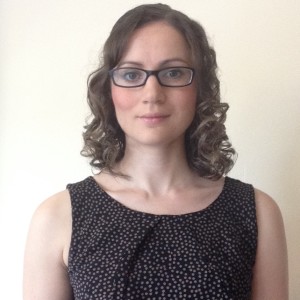 Tell us a little about your work: Lamiece is a health services researcher and public involvement specialist at The University of Manchester. With a background in psychology, her research has explored topics such as health promotion, mental health in prisons and psychotropic medicines. Her current work focuses on how we can use digital technologies and health data in trustworthy ways to empower patients and improve health.
Tell us a little about your work: Lamiece is a health services researcher and public involvement specialist at The University of Manchester. With a background in psychology, her research has explored topics such as health promotion, mental health in prisons and psychotropic medicines. Her current work focuses on how we can use digital technologies and health data in trustworthy ways to empower patients and improve health.
Which famous scientist do you admire most and why?’: I really admire the work of the social scientist, Erving Goffman. Goffman’s work is all about picking apart the language, rules and roles that permeate our everyday social interactions. His work is fascinating! I have always been interested in language and have a tendency to over-analyse social situations, so his work and attention to detail really resonates with me.
What do you think has been the most influential scientific breakthrough in your lifetime?: Rather than picking out one, I would say the progressive improvements and discoveries from the field of computer science that have allowed the internet to become a ubiquitous force in our lives. It has, and continues to, deeply affect the way we interact and exchange information, mostly for the better I’d say. I can’t imagine life without it.
If you weren’t an academic what type of job do you think you would have?: Seal sanctuary leader, if that’s an actual job! I have always been obsessed with seals. I don’t really know why.
Isabel Hutchison
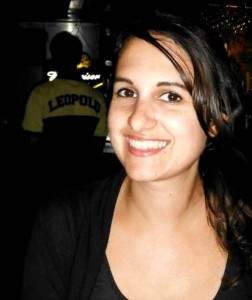 Tell us a little about your work: I’m currently working on a Ph.D. in Psychology at the University of Manchester Sleep Lab (we cleverly call ourselves N.A.P.S. – Neuroscience And Psychology of Sleep). I focus on how emotional memories evolve across sleep and how we can manipulate this process by playing sounds to people or applying electrical stimulation to their brains while they sleep.
Tell us a little about your work: I’m currently working on a Ph.D. in Psychology at the University of Manchester Sleep Lab (we cleverly call ourselves N.A.P.S. – Neuroscience And Psychology of Sleep). I focus on how emotional memories evolve across sleep and how we can manipulate this process by playing sounds to people or applying electrical stimulation to their brains while they sleep.
What first attracted you to science?: One of the first encounters with science I vividly remember was watching Jurassic Park when I was 4 years old. I asked my Dad (also a scientist) to explain the whole DNA thing to me and, even though he pointed out that making dinosaurs out of frogs was a bit of a leap (*cough*), the fascination still stuck.
What do you like to do when you’re not working?: I have a bluegrass guitar which I sometimes play, also play the piano when I’m feeling sentimental. Otherwise, I like drawing people (these days it’s usually seminar speakers) and reading science fiction.
If you weren’t an academic what type of job do you think you would have?: I could see myself as a journalist, writing about science, travelling, odd human behaviour. Definitely would strive to be a female Jon Ronson.
Dr Sam Illingworth
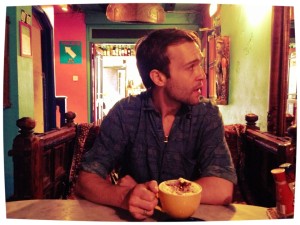 Tell us a little about your work: I have always been very passionate about the links between Sciences and the Arts, and spent a couple of years in Japan after my PhD on a Dawia Anglo-Japanese Foundation scholarship investigating how theatrical technique can be used to improve effective scientific communication. In my job as a lecturer in Science Communication at Manchester Metropolitan University (MMU), I continue this work and help to to train future scientists in how to communicate with a variety of audiences in an effective and engaging manner.
Tell us a little about your work: I have always been very passionate about the links between Sciences and the Arts, and spent a couple of years in Japan after my PhD on a Dawia Anglo-Japanese Foundation scholarship investigating how theatrical technique can be used to improve effective scientific communication. In my job as a lecturer in Science Communication at Manchester Metropolitan University (MMU), I continue this work and help to to train future scientists in how to communicate with a variety of audiences in an effective and engaging manner.
Which famous scientist (fictional or non) would you say you are most like and why?: I would like to think that I am like the genre-straddling C.P. Snow, he of ‘The Two Cultures’ fame, who like me also had the University of Leicester as his alma mater. However, in reality I am probably more like Dr Bunsen Honeydew, as I cannot fathom a world without an Automatic Wastebasket.
What do you like to do when you’re not working?: When I’m not working I enjoy writing plays and short fiction, a collection of which can be found here. I also love playing Japanese RPGs, although I still haven’t quite gotten over the traumatic event of my sister wiping a 120-hour Final Fantasy 7 play through with a level-1 Crash Bandicoot save (and yes, this did happen almost 15 years ago).
If you weren’t an academic what type of job do you think you would have?: I would like to think that I would have been an actor. However, seeing as my last TV appearance was as an Irish Junkie in ITV4’s ‘Real Prison Breaks’, I think this unlikely.
Jennifer Jardine
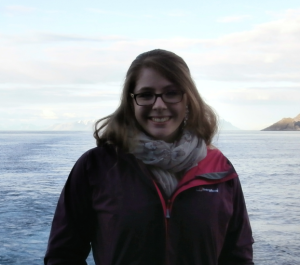 Tell us a little about your work: I’m currently doing a PhD at Liverpool University, looking how the ocean physics impacts the microbiology in coastal seas. More specifically, I’m interested in phytoplankton, which are basically tiny aquatic organisms that act like the grass of the sea, and account for 50% of the worldwide oxygen production. The distribution of these cells within the ocean is very patchy, and so I’m trying to figure out what processes makes their pattern so irregular. This includes a whole bunch of stuff, including tides, waves, weather and if the phytoplankton are being grazed by larger herbivorous cells called zooplankton. On paper, I’m a physical oceanographer, but in truth, I’m more of an ocean bio-physicist with a bit of chemistry on the side.
Tell us a little about your work: I’m currently doing a PhD at Liverpool University, looking how the ocean physics impacts the microbiology in coastal seas. More specifically, I’m interested in phytoplankton, which are basically tiny aquatic organisms that act like the grass of the sea, and account for 50% of the worldwide oxygen production. The distribution of these cells within the ocean is very patchy, and so I’m trying to figure out what processes makes their pattern so irregular. This includes a whole bunch of stuff, including tides, waves, weather and if the phytoplankton are being grazed by larger herbivorous cells called zooplankton. On paper, I’m a physical oceanographer, but in truth, I’m more of an ocean bio-physicist with a bit of chemistry on the side.
What were your favorite subjects at school and why?: I loved all the subjects that helped me understand how the world works. How are mountains formed? What makes a hurricane? Why is the ocean salty? All these questions incorporate aspects from physics, chemistry, biology and geography, all of which I enjoyed at school. That being said, if I had to pick an absolute favourite, I’d have to go with geography, simply because we got to throw a inflatable globe around the classroom.
What’s your geekiest secret?: I was trying to see if the height and shape of the seabed was the cause of some interesting results closer to the ocean’s surface. So I downloaded the data I needed and plotted it up as a 3D image which you can rotate, change colour and view from any angle. This was the first time I had plotted data this way, and I was engrossed with seeing all the ocean’s nook and crannies. Procrastination ruled for the next few hours as I downloaded data for the whole world, and ended up looking at a glacial valley somewhere in the Himalayas.
What do you like to do when you’re not working? : Over the years, I’ve had a go at everything from ice skating to kung fu, but what consistently grabs my attention is creative writing. I always have a story going, and most free time I get involves a cup of hot chocolate and me typing away, describing some grand adventure or fantastical landscape.
Stephanie Macdonald
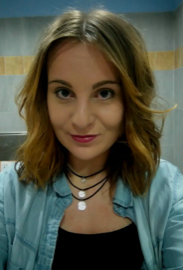 Tell us a little about your work: My research focuses on the role DNA accessibility plays in gene expression during obesity. Obesity arises through the expansion of adipose tissue. There are two main types of adipocytes, white adipocytes (WAT) which are fat storing, and brown adipocytes (BAT) which are fat burning. Higher levels of brown adipocytes directly correlate to a lower BMI suggesting therapeutic potential for brown adipocytes. However before we can use BAT therapeutically we need to fully understand its transcriptional programing. DNA accessibility directly affects transcription. One factor influencing accessibility is the incorporation of histone variants at regulatory regions. Histone variant H2A.Z is a key variant during lineage commitment. I look at not only where H2A.Z is incorporated in the genome, but also at what time point during brown adipogenesis to help us identify potential novel therapeutic targets.
Tell us a little about your work: My research focuses on the role DNA accessibility plays in gene expression during obesity. Obesity arises through the expansion of adipose tissue. There are two main types of adipocytes, white adipocytes (WAT) which are fat storing, and brown adipocytes (BAT) which are fat burning. Higher levels of brown adipocytes directly correlate to a lower BMI suggesting therapeutic potential for brown adipocytes. However before we can use BAT therapeutically we need to fully understand its transcriptional programing. DNA accessibility directly affects transcription. One factor influencing accessibility is the incorporation of histone variants at regulatory regions. Histone variant H2A.Z is a key variant during lineage commitment. I look at not only where H2A.Z is incorporated in the genome, but also at what time point during brown adipogenesis to help us identify potential novel therapeutic targets.
What was your favorite subject at school: Obviously while I did always enjoy the sciences I’d actually say my favorite subject was art and design. I liked the freedom art gave me to be creative and push the boundaries, much like research!
What is the most exciting aspect of your work: The most exciting aspect of my PhD is the fact I get to do my middle two years in Singapore! Rather than working within a university environment I’m based at a government research institute (A*STAR) which enables me to gain experience in different research environments. It also gives me the opportunity to do lots of traveling and sightseeing of Southeast Asia (obviously whilst not busy in the lab!). Most importantly it’s been a great opportunity to experience expat life!
What do you like to do when you are not working: At the moment when I’m not working I’m exploring Singapore or traveling to neighboring countries, I love last minute flights to new places! Other than that I try to get to the gym as much as possible for Pilates, mixed martial arts and weight classes. I’ve also just got back into painting, especially with the great landscapes round here!
Tarah Patel
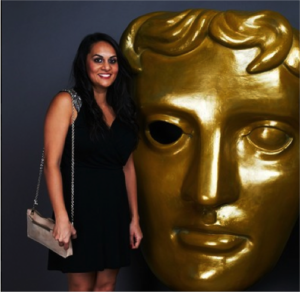 Tell us a little about your work: I currently work as a Program Coordinator within the film education sector for an organisation called Into Film, which involves organising film watching and filmmaking outreach projects for schools, colleges and non-school settings. I have a background in science learning and STEM enrichment having been a Biology Teacher for 3 years, and also a Science Writer, Medical Writer and STEM Development Manager. As such, I have experience of science communication, and delivering curricular and extra-curricular outreach activities, to young people aged between 5 to 19 years old, and providing support to teachers and educators through various training programmes.
Tell us a little about your work: I currently work as a Program Coordinator within the film education sector for an organisation called Into Film, which involves organising film watching and filmmaking outreach projects for schools, colleges and non-school settings. I have a background in science learning and STEM enrichment having been a Biology Teacher for 3 years, and also a Science Writer, Medical Writer and STEM Development Manager. As such, I have experience of science communication, and delivering curricular and extra-curricular outreach activities, to young people aged between 5 to 19 years old, and providing support to teachers and educators through various training programmes.
What were your favourite subjects at school and why?: Without a doubt, my favorite subject was Biology! I always found the human body fascinating and I still do! The way all our systems work without having to consciously do anything is just fascinating. I also had a great teacher at A-Level who made the topics come to life and encouraged us to think about wider issues related to science. I enjoyed languages too and did French and German at GCSE. I liked learning about the patterns within the grammar and words. I suppose it’s a bit like solving puzzles, once you figure out the rules and how the verbs and conjugations work, then you can translate from English! Or least try to! In a similar way, I think this is why I liked Maths as there were rules and equations to solve problems. It’s how my mind works – I like logical processes!
What is your geekiest secret?: I chose A-Level Chemistry at school and it was one of the most difficult subjects I ever studied! In fact, looking back, I still think it was and that’s despite having studied a degree in Neuroscience for 4 years! I knew it would be tough and I had prepared myself for the fact that I would have to go the extra mile if I wanted to get a good mark. So I asked the teacher to give me his entire exam past paper collection and I would practise one or two every weekend. To then mark them and see how I’d done, I had to ask him for the mark schemes each week and at lunchtime I would go and sit in an old cleaning cupboard by myself (I guess we weren’t allowed in the science labs alone!) and mark them. All my friends would be having lunch and socialising, but I sacrificed that for the good of my Chemistry learning! I am a true science geek – and proud of it! In the end, I got the grade I wanted, so it was worth the effort!
What do you like to do when you’re not working?: I love cooking and trying new foods and dishes, so I suppose this is why I like going on holiday and traveling so much, so I can try everything on offer! I’m particularly fond of Italy, because it’s a food-lover’s paradise! I’m also in the process of learning some basic Italian and I went to Spanish language classes for a few years, so I can get by when I’m abroad. I also like keeping fit – walking, swimming, going to the gym, yoga, and I enjoy watching films and going to the cinema, which worked out well since my job is currently in film education!
Jennifer Rasal
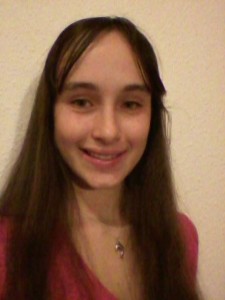 Tell us a little about your work: I’m a 2nd year undergraduate student at the University of Liverpool studying Marine biology. I’m interested in so many areas of the marine world that it’s going to be hard to find one area to pursue. On my course we get to look at all the dynamics of the oceans, not just the major life forms but the physics behind the currents, the seasonal cycles of the ecosystems every year, as well as dabbling in other modules such as animal behaviour and computer software like GIS.
Tell us a little about your work: I’m a 2nd year undergraduate student at the University of Liverpool studying Marine biology. I’m interested in so many areas of the marine world that it’s going to be hard to find one area to pursue. On my course we get to look at all the dynamics of the oceans, not just the major life forms but the physics behind the currents, the seasonal cycles of the ecosystems every year, as well as dabbling in other modules such as animal behaviour and computer software like GIS.
What first attracted you to science?: In one word, fish. I was lucky enough to snorkel in the Caribbean from a young age and seeing all those bright colourful fish was always the highlight of the holiday for me. I actually made the decision to look into studying marine biology whilst I was snorkelling and since then I’ve never looked back.
What do you like to do when you’re not working?: Wow, where to begin? My taste in hobbies are fairly old fashioned, I love knitting, cross stitch, drawing, painting, and baking. I have a lot of patience and have sat for hours hand sewing little strips of fabric together to make a rug. On the other hand I love playing octopush as well, a great sport that is basically underwater hockey. I’m not a great player but it’s loads of fun. I also like scuba diving, traveling and reading. It’s safe to say I keep myself busy!
What is the most exciting aspect of your work?: As my ‘job’ is currently to get a degree the most exciting aspect is all the future prospects (as well as all the fun lectures). Right now I can go in any direction, and do anything with my life. To me that will always be exciting.
Samantha Lawrence
 Tell us a little about your work: My research involves looking at how fruit fly larva smell and process complex odours from their environment. Currently, we know how single component odours are perceived in the larval brain, but little work has been carried out into how complex multi-component odours are processed. Since most odours in the environment are complex, it is important to address this. Currently there are several theories regarding the perception of these complex odours, which I aim to address by using a combination of behavioural techniques, and by measuring the activity of neurons in the brain.
Tell us a little about your work: My research involves looking at how fruit fly larva smell and process complex odours from their environment. Currently, we know how single component odours are perceived in the larval brain, but little work has been carried out into how complex multi-component odours are processed. Since most odours in the environment are complex, it is important to address this. Currently there are several theories regarding the perception of these complex odours, which I aim to address by using a combination of behavioural techniques, and by measuring the activity of neurons in the brain.
Tell us your most interesting science fact or funniest science joke: This isn’t really a funny science joke, or the most fascinating fact, but I thought it was interesting! Biology is the only discipline where multiplication means the same thing as division.
What do you like to do when you’re not in the lab?: I love spending my spare time reading, there is nothing quite like getting lost in a good book! My favourite author at the moment is Matthew Reilly, and I am also partial to a bit of JK Rowling! I like to go shopping when I have some spare time, and love going to the cinema with my friends. I also volunteer for a charity, and love looking after my two guinea pigs!
What were your favourite subjects at school and why?: I was a bit of a nerd at school and enjoyed most of my subjects, although I would have to admit that my favourite subject was surprisingly geography. This was mainly because I had a great teacher who was really charismatic and was really funny!
Dr. Jadwiga Nazimek
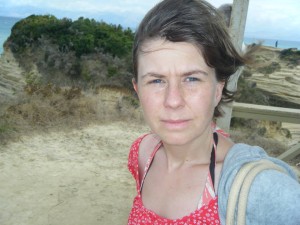
Tell us a little about your work: I have a PhD in cognitive neuroscience: I studied auditory processing with functional magnetic resonance imaging. My PhD project was related to auditory hallucinations, as I am particularly interested in neural underpinnings of psychosis and schizophrenia. Currently I work in a clinical trial of a new medication that could help with schizophrenia.
What were your favourite subjects at school and why?: I liked geography. The teacher addressed our mixed-gender class as ‘girls’. He used to line up a few people at a time and throw quite large rocks for them to identify. We quickly learned to catch the rocks!
What first attracted you to science?: Curiosity – the endless ‘why’ question. I wanted to know why and how things happen – there is always more to find out and I love the feeling of filling in the gaps.
What do you like to do when you’re not working?: I am a bit of an exercise fanatic. I run and practice karate and vinyasa yoga. There is nothing better to motivate you to run than a border collie attached to you with a running lead. I also write (and publish) poems and stories for children.
Philip Thomas
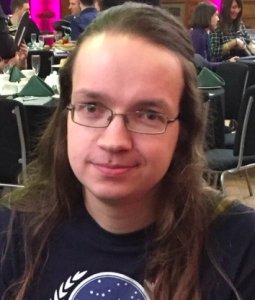 Tell us a little about your work: I’m a physicist working in nano-optics. I design and study nanostructures to create new optical phenomena that don’t occur naturally.
Tell us a little about your work: I’m a physicist working in nano-optics. I design and study nanostructures to create new optical phenomena that don’t occur naturally.
What do you like to do when you’re not working?: Like most people, I enjoy traveling, hiking, swimming, music and film. Much of my non-work time is dedicated to telling others about science at festivals, fairs and schools, writing music, leading Bible studies, DIY projects and writing the occasional blog post.
What do you think has been the most influential scientific breakthrough in your lifetime?: The isolation of graphene has inspired a huge amount of research; within academic circles graphene is certainly the most influential breakthrough. Whether or not that will translate into new technologies capable of influencing people’s daily lives remains to be seen.
If you weren’t an academic what type of job do you think you would have?: Something creative: research, writing, music, maybe even comedy. I’m not sure.
Dr Louise Walker @thinkscientific
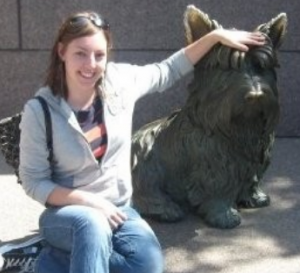 Tell us a little about your work: I completed a PhD in Cell Biology at the University of Manchester in 2013. I was investigating a function called endocytosis, which is like the rubbish disposal system for the cell. It sorts unneeded proteins between those which can be recycled and those which need to be removed from the cell. My research involved investigating some of the components which control this system in great detail in order to better understand how the system works as a whole.
Tell us a little about your work: I completed a PhD in Cell Biology at the University of Manchester in 2013. I was investigating a function called endocytosis, which is like the rubbish disposal system for the cell. It sorts unneeded proteins between those which can be recycled and those which need to be removed from the cell. My research involved investigating some of the components which control this system in great detail in order to better understand how the system works as a whole.
What were your favourite subjects at school and why?: My favourite subject was unsurprisingly Biology, as I found it continually fascinating, especially what happens inside us. I also really liked English, as I love to read and analyse (maybe that’s got something to do with the science?) but also it allowed me to flex my creative muscles, which I really enjoyed.
What first attracted you to science?: I loved finding out about how everything worked and how everything has evolved to work together, both within one organism and how different organisms and animals rely on each other. As a researcher, I liked the idea of making my little contribution to our understanding of how something works, even if it’s not the greatest breakthrough ever! I also like the idea of what I call “behind the scenes” work. Without dedicated scientific researchers, we wouldn’t have many of the treatments and cures for illnesses that we take for granted now.
Tell us your most interesting science fact or funniest science joke: This is a pretty bad one but it’s probably the funniest one I know. Two electrons are walking down the street. One turns to the other and says “Oh dear, I think I’ve just reversed polarity!” The second says “Are you sure?” and the first one replies, “Yes, I’m positive!”
Adam Watson
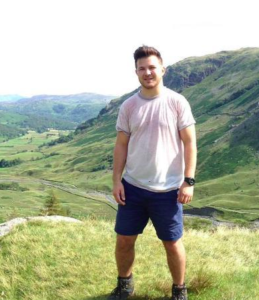 Tell us a little about your work:
I’m interested in the circadian (from Latin circa-approx. diem- a day) system, which functions to drive daily rhythms our behaviour and physiology and also keeps these rhythms in sync with predictable daily cycles in the environment, the most prominent being the transition of light and darkness. Thanks to a special set of genes and proteins that function as a clockwork, every cell in your body can measure the passage of approximately 24-hours. So, every cell is part of the circadian system. However, cells in specialised regions of the brain possess particularly robust and self-sustainable clockwork. One of clock-containing areas has an important role in controlling appetite. I’m trying to tease out how the clock shapes the activity of this brain region. I spend 90 percent of my time in the electrophysiology suite, located on the ground floor in the AV Hill building, recording from single cells that contain the genetic clockwork, investigating what makes them tick, and how the ticking influences neuronal activity across the day.
Tell us a little about your work:
I’m interested in the circadian (from Latin circa-approx. diem- a day) system, which functions to drive daily rhythms our behaviour and physiology and also keeps these rhythms in sync with predictable daily cycles in the environment, the most prominent being the transition of light and darkness. Thanks to a special set of genes and proteins that function as a clockwork, every cell in your body can measure the passage of approximately 24-hours. So, every cell is part of the circadian system. However, cells in specialised regions of the brain possess particularly robust and self-sustainable clockwork. One of clock-containing areas has an important role in controlling appetite. I’m trying to tease out how the clock shapes the activity of this brain region. I spend 90 percent of my time in the electrophysiology suite, located on the ground floor in the AV Hill building, recording from single cells that contain the genetic clockwork, investigating what makes them tick, and how the ticking influences neuronal activity across the day.
What were your favourite subjects at school and why?: When I get asked what my favourite subjects were at school, most expect me to say biology. It’s the obvious choice. However, whilst I found biology interesting, I found other subjects equally enjoyable. Looking back, there are few parallels between what I enjoy about biology now versus what was offered in high school lessons. At the time I was more motivated in subjects that were exploratory. I found chemistry interesting because we were solving problems. I liked music because we were encouraged to think outside the box. That said, my favourite lessons at school were biology practical sessions, however we only had a few of these during A-levels. I decided to study neuroscience at university to apply my fundamental knowledge to experiments and pursue the practical aspect of my biology lessons.
What first attracted you to science?: Hard work and motivation are the keys to success in any career. To be a successful academic it pays to be career-driven just like any other profession. However, what other profession pushes boundaries like academics do? There is something very poetic about how scientists conduct their work. This is what attracted me to science.
What do you like to do when you’re not working?: I like to keep myself busy. I wouldn’t be as effective in the lab without football. I also train in Brazilian Jiu Jitsu (BJJ) and enjoy regular competition. I began learning double-bass from a young age, and continue to enjoy playing as a hobby. Before my appetite for science developed, I was seriously considering a career in music performance. I also picked up guitar somewhere along the way. It’s great to come back home to after work. I enjoy socialising with friends – a cliché I know, but it’s true.
Claire Wilson
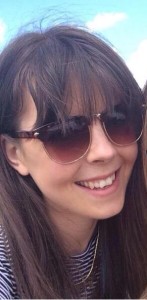 Tell us a little about your work: Arrhythmias are abnormal heart rhythms and are one of the top 10 reasons why people go to hospital. An individual’s genetics can influence their chance of developing an arrhythmia. So, to look at how genes factor in heart rhythm problems, I am looking at a gene linked to several areas of heart disease. By altering gene expression in heart cells, I am going to see how it is involved in keeping the heart rhythm stable and how it may influence the chances of arrhythmias developing, which could potentially point to new therapeutic targets.
Tell us a little about your work: Arrhythmias are abnormal heart rhythms and are one of the top 10 reasons why people go to hospital. An individual’s genetics can influence their chance of developing an arrhythmia. So, to look at how genes factor in heart rhythm problems, I am looking at a gene linked to several areas of heart disease. By altering gene expression in heart cells, I am going to see how it is involved in keeping the heart rhythm stable and how it may influence the chances of arrhythmias developing, which could potentially point to new therapeutic targets.
What first attracted you to science?: My mum once got told at a parents evening that “Claire would do really well at science if she just enjoyed it more” so I guess nothing at first! As I got older the endless “WHY?” questions associated with science is what somehow led me to a PhD.
What do you like to do when you’re not working?: I watch a lot of sports. I won’t tell you who I support… just in case this somehow makes you instantly loath my posts! I love eating out so I do a bit of running too to compensate. I’m also into fashion and arty things, and would probably have gone into textiles if science hadn’t taken over.
What is the most exciting aspect of your work?: That every day is different!! Also you don’t know what the outcome is going to be. This is can be very frustrating when the result isn’t what you want, but when you remember you’re looking into something that no one else has… that’s pretty cool.
Follow us on twitter @brainbankmanc
Past contributors:
Gemma Barnacle
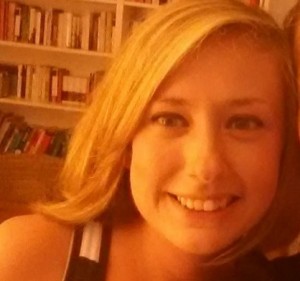 Tell us a little about your work: I use neuroimaging techniques (electroencephalography – EEG; and functional magnetic resonance imaging – fMRI) to investigate what happens in the brain when we form emotional memories. My PhD project look at a particular stage of memory called encoding (the moment you see an item) and how what happens during this stage may influence later memory. The main focus of my research is to find out how these influences may be different for emotional and non-emotional items. In particular I hope that my research will add significant theoretical and neuroscientific data to the prevalent model of emotional memory which focuses only on a later stage of memory formation and not encoding. Although my research tests only healthy participants at present, I hope that there may also be clinical applications for example to develop interventions where emotional memories are troublesome, e.g. in post-traumatic stress disorder (PTSD).
Tell us a little about your work: I use neuroimaging techniques (electroencephalography – EEG; and functional magnetic resonance imaging – fMRI) to investigate what happens in the brain when we form emotional memories. My PhD project look at a particular stage of memory called encoding (the moment you see an item) and how what happens during this stage may influence later memory. The main focus of my research is to find out how these influences may be different for emotional and non-emotional items. In particular I hope that my research will add significant theoretical and neuroscientific data to the prevalent model of emotional memory which focuses only on a later stage of memory formation and not encoding. Although my research tests only healthy participants at present, I hope that there may also be clinical applications for example to develop interventions where emotional memories are troublesome, e.g. in post-traumatic stress disorder (PTSD).
What first attracted you to science?: The first time I chose to study science was at ‘A’ Level in school. For me, it was a rather strange and unexpected decision because my favourite subjects were in the Arts and languages. I made a decision which I now look back on as rather too sensible – that I should study the topics I was naturally less competent at and less inclined to, because I felt it would be easier to advance my knowledge of the topics I was fond of on my own. It was my idea at that time that this would give me a more rounded knowledge.
What is your geekiest secret?: Besides an interest in neuroscience I am also a keen cook, and like to have a fully stocked kitchen of various herbs and spices etc. I was once told that plants grow better if you talk or sing to them, and so I decided that my kitchen herbs should also have names. The basil plant was a fond favourite for making amusing names, the best (or worst!) of which had to be ‘Basil Ganglia’ (of course, it has to be said in an American accent to make the joke funny).
If you weren’t an academic what type of job do you think you would have?: If I weren’t an academic, I’d like to have a job that combines science with some form of creativity. I like to play around with ideas of how to convey science to different audiences, and I think it’d be a great job to work in a science museum or in a commissioned role to create art / information installations to engage the public in science. Communication of complex topics can be such an extraordinarily difficult task, but as a consumer of science / art I find it exhilarating when it is done well, and I’d like to pass on that exhilaration to other people about my topic.
Dr. Elizabeth Granger (@bio_fluff)
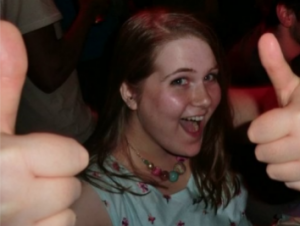 Tell us a little about your work: I work on a protein called dynein. It’s a motor protein, which means it can move things around inside our cells. Despite being miniscule – just about visible under an electron microscope – dynein has two legs which walk around a network of tiny tubes inside our cells. My research focuses on how dynein is controlled and what makes it grab hold of a cargo and start moving it around.
Tell us a little about your work: I work on a protein called dynein. It’s a motor protein, which means it can move things around inside our cells. Despite being miniscule – just about visible under an electron microscope – dynein has two legs which walk around a network of tiny tubes inside our cells. My research focuses on how dynein is controlled and what makes it grab hold of a cargo and start moving it around.
What first attracted you to science: I was about 10 watching Dexter’s Lab. I thought; Dexter’s cool, his lab is bitchin’ and he’s rocking a kick-ass boots/purple nitrile glove/lab coat combo. What a dude. I’m going to be a scientist like Dexter. I’ve made most of my life decisions based on cartoons since.
Tell your most interesting science fact/funniest science joke: Did you hear about the biologists who had just had twins? They baptised one and kept the other as a control.
What is your geekiest secret?: I own and have played hero quest. Google it; you’ll be jealous.
Christopher Logie
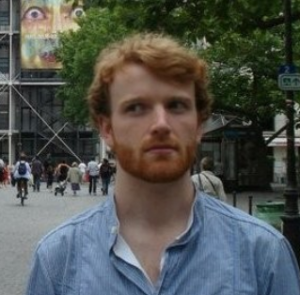 Tell us a little about your work: All of your movements are coordinated by your brain. Without a system of coordination you would be unable to do any task as simple as writing or kicking a ball. Learning and remembering these movement patterns is directed by a part of the brain known as the basal ganglia, which I study using a technique that allows us to see how individual neurons communicate with one another.
Tell us a little about your work: All of your movements are coordinated by your brain. Without a system of coordination you would be unable to do any task as simple as writing or kicking a ball. Learning and remembering these movement patterns is directed by a part of the brain known as the basal ganglia, which I study using a technique that allows us to see how individual neurons communicate with one another.
Tell us your most interesting science fact or funniest science joke: Did you know that fully one quarter of all the cells in your body are red blood cells? And that your body produces three million red blood cells every second?
What do you like to do when you’re not in the lab?: Running and swimming a lot. And football is important too. I used to watch many films and play many games but I don’t have as much free time these days!
What do you think has been the most influential scientific breakthrough in your lifetime?: If faster-than-light neutrinos are confirmed, that’ll be the biggest scientific breakthrough for some time. Anything that challenges Einstein’s theories is BIG. A lot of very smart people are scratching their heads at the moment.
Clare McCullagh
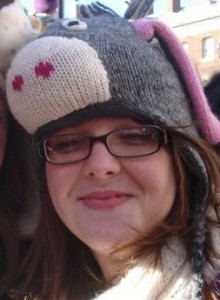 Tell us a little about your work: I came to Manchester to study Cognitive Neuroscience and Psychology. I really enjoyed studying for this degree, particularly when one a lecturer really opened up about his family life and how schizophrenia had affected them. It was a really honest and open moment and it made me realise how everybody has a story to tell. I currently work as an administration assistant for a Postgraduate MSc. But, since I’m still really interested in science, I hope to complete an MSc in medical imaging before I turn 30. To keep my brain bubbling I also attend a lot of seminars and general science events.
Tell us a little about your work: I came to Manchester to study Cognitive Neuroscience and Psychology. I really enjoyed studying for this degree, particularly when one a lecturer really opened up about his family life and how schizophrenia had affected them. It was a really honest and open moment and it made me realise how everybody has a story to tell. I currently work as an administration assistant for a Postgraduate MSc. But, since I’m still really interested in science, I hope to complete an MSc in medical imaging before I turn 30. To keep my brain bubbling I also attend a lot of seminars and general science events.
What first attracted you to science?: I wasn’t ready for Uni at 18, so I took a year out, during which I worked with some amazing people as a healthcare assistant. Here I got to see all kinds of maladies. I saw dementia at its scariest and marveled at how some patients would change in the blink of an eye. I learnt patience and resilience here and it sparked my interest in all things neuroscience related.
Catherine McGuire
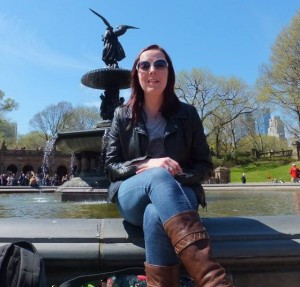 Tell us a little about your work: I am a PhD student at the University of Manchester studying massive star formation i.e. the formation of stars with greater than 10 times the mass of the Sun. Based on the current understanding of the formation of lower mass stars, stars with greater than 10 times the mass of the Sun should not be able to form, yet they are abundant in the universe. I am helping to investigate why this might be. Stars play an important role in the evolution of galaxies and the universe as a whole, so a complete understanding of how they form is of great importance to many areas of astrophysics.
Tell us a little about your work: I am a PhD student at the University of Manchester studying massive star formation i.e. the formation of stars with greater than 10 times the mass of the Sun. Based on the current understanding of the formation of lower mass stars, stars with greater than 10 times the mass of the Sun should not be able to form, yet they are abundant in the universe. I am helping to investigate why this might be. Stars play an important role in the evolution of galaxies and the universe as a whole, so a complete understanding of how they form is of great importance to many areas of astrophysics.
Tell us your most interesting science fact or funniest science joke: Heisenberg is out for a drive when he’s stopped for speeding. The policeman says “Do you know how fast you were going?” Heisenberg says “No, but I know where I am.”
What is your geekiest secret?: I’m a bit of a mushroom spotter. I have numerous books on identifying mushrooms and my phone is filled with pictures of them. I get embarrassingly excited if I spot an interesting mushroom when I am out walking!
What do you like to do when you’re not working?: I like doing anything crafty, usually something different every week! I don’t like shopping so when birthdays and Christmas come up I like to make presents instead. I also love anything that gets me outdoors. I am an avid forager of wild foods and have fun making unusual recipes with what I find.
Claire Scofield @clairescofe
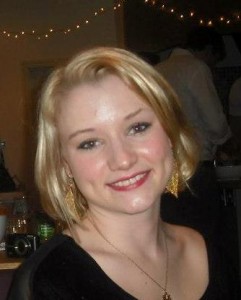 Tell us a little about your work: My research is investigating how brain activity is disrupted in schizophrenia. To study this, we induce a schizophrenia-like state in rats by administering ketamine or similar drugs. The behavioural effects are thought to be analogous to the human response to ketamine: a psychotic state similar to schizophrenia. In rats, under anaesthetic it is possible to record the activity of brain cells in different regions of the brain, and look at activity across the whole brain using an MRI scanner. This also means we can look at how communication between different regions of the brain is disrupted by ketamine. Once we see ways in which brain activity is altered in the psychotic state, it is also possible to investigate the effects of anti-psychotic drugs on these changes.
Tell us a little about your work: My research is investigating how brain activity is disrupted in schizophrenia. To study this, we induce a schizophrenia-like state in rats by administering ketamine or similar drugs. The behavioural effects are thought to be analogous to the human response to ketamine: a psychotic state similar to schizophrenia. In rats, under anaesthetic it is possible to record the activity of brain cells in different regions of the brain, and look at activity across the whole brain using an MRI scanner. This also means we can look at how communication between different regions of the brain is disrupted by ketamine. Once we see ways in which brain activity is altered in the psychotic state, it is also possible to investigate the effects of anti-psychotic drugs on these changes.
What first attracted you to science?: Well I just read the quote “Science is just magic without the lies” and completely agreed so I think it was just curiosity. Especially when it comes to the brain – trying to work out how things work and how things go wrong in the brain to produce diseases fascinates me.
Tell us your most interesting science fact or funniest science joke: I’m going to apologise for this before writing it, but…One lab rat to his cage-mate: “I’ve got my scientist so well-trained he brings me a treat whenever I press the bar”
What do you like to do when you’re not in the lab?: When I’m not in the lab I’ve recently started kick-boxing as a very good stress-reliever! I also play netball and I like going to see any type of music (well almost), especially if it involves spending a few days in a muddy field!
Isabelle Abbey-Vital
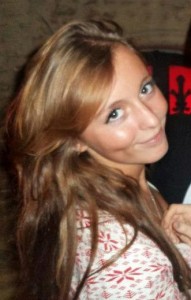 Tell us a little about your work: I am currently in my final year studying neuroscience at Manchester University. I chose neuroscience because I had always wanted to understand more about the brain and how it controls everything we do. My course involves many different aspects of neurobiology from how drugs affect the brain to what areas are involved in how we move and learn. It is an exciting subject to be studying because we are discovering new things all the time – so it never gets boring!
Tell us a little about your work: I am currently in my final year studying neuroscience at Manchester University. I chose neuroscience because I had always wanted to understand more about the brain and how it controls everything we do. My course involves many different aspects of neurobiology from how drugs affect the brain to what areas are involved in how we move and learn. It is an exciting subject to be studying because we are discovering new things all the time – so it never gets boring!
What were your favourite subjects at school and why?: My favourite subjects at school were psychology and biology. I found the case studies we explored about psychological disorders really interesting, and I loved all the dissecting labs in science class.
What first attracted you to science?: I first became interested in science when I began reading in newspapers and magazines about all of the research that is constantly going on all around the world and how much it is doing to help our understanding of everything that exists. I found it fascinating and wanted to know more!
Tell us your most interesting science fact or funniest science joke: It has recently been estimated that every cell contains enough genetic information to fill 1,000 books each 600 pages long. And considering we have trillions of cells in our body, that is a lot of DNA!
Dr. Natasha Bray
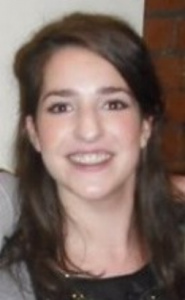 Tell us a little about your work: My PhD research was into how the brain deals with having a stroke, and how inflammation can make brain damage from a stroke worse. I used a special imaging technique called optical imaging to measure how blood flow in the brain changes after a stroke.
Tell us a little about your work: My PhD research was into how the brain deals with having a stroke, and how inflammation can make brain damage from a stroke worse. I used a special imaging technique called optical imaging to measure how blood flow in the brain changes after a stroke.
Tell your most interesting science fact/funniest science joke: A virus walks into a bar. The bartender says, ‘We don’t serve viruses here’. The virus infects the bartender and says, ‘Now we do’.
What first attracted you to science?: I was very lucky to have some really excellent science teachers at school, and then I was AMAZED by Matt Ridley’s Nature via Nuture (genetics isn’t that scary after you read that). At school I had to do an ‘extended research essay’ and, for whatever reason, I chose to (try to) write an essay on the (myriad) possible causes of schizophrenia. When writing about (/not even scratching the surface of) the different theories behind schizophrenia, I was stunned by the sheer complexity of the brain and by the fact that so many questions remain unanswered.
Oliver Freeman @ojfreeman
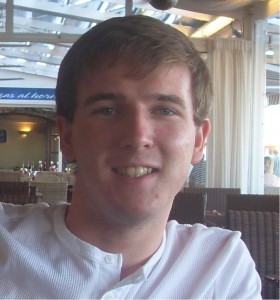 Tell us a little about your work: My research looks into the effects of diabetes on the nervous system. Diabetes is nearly 4 times as common as all types of cancer combined and around half of those with diabetes have nerve damage (known as diabetic neuropathy). Most people are not aware of this very common condition and I am trying to increase awareness of the disorder and understand what causes diabetic patients to feel increased pain and numbness/tingling in their hands/feet.
Tell us a little about your work: My research looks into the effects of diabetes on the nervous system. Diabetes is nearly 4 times as common as all types of cancer combined and around half of those with diabetes have nerve damage (known as diabetic neuropathy). Most people are not aware of this very common condition and I am trying to increase awareness of the disorder and understand what causes diabetic patients to feel increased pain and numbness/tingling in their hands/feet.
What is the most exciting aspect of your work?: My work aims to discover new ways to diagnose patients with diabetes and nerve damage. The Holy Grail would be to produce a simple blood test which will tell your doctor the severity or likelihood of you developing diabetic neuropathy. For now, it means analysing lots of molecules in the body to try to find one (or more) that are particularly affected in diabetic neuropathy.
What first attracted you to science?: I’m not entirely sure really – I think I just fell into it! I liked the diverse nature of science; my days always consist of many different aspects and I’m never sat doing the same task for too long at a time.
What do you like to do when you’re not in the lab?: I love keeping fit by playing football and squash. I also like to cycle around pretending I am Bradley Wiggins – the sideburns are taking a while to perfect.
Title image credit – Dellboyy Art
Save
Save
Hi there
I’m very impressed with your pitures and short explanations for parts of the brain. I’m trying to find good illustrations for my own PhD – I am in final edit mode now. I wondered if you would allow me to use some of your illustrations (with credit, of course!) for my chapter on mechanisms of acupucnture for schizophrenia?
Patricia
Many thanks for your comment:
Now that sounds like an interesting thesis. I would say I’m generally quite cynical toward alternative medicines, however I’m also willing to admit, as it stands, I have not done my research into the area so would be intrigued to know more! As for the images, I can’t claim ownership to these, since most have been found on the net (fine for a blog, but best not to do this in a thesis!). However if you know what specific images you are looking for I could possibly point you in the right direction.
Sarah
Very interesting post. nice blog
20130406 Dear folks, many thanks fro your website. I found by chance when looking at another science site, came to see, was engrossed, no adicted (!). Very large range and with some eight decades of stored memories and many years of mathematics and engineering I found it enlightening. Keep searching, keep dispencing the bits you find interesting , remember in this life we must learn and passon our knowledege. Thanks
Hello, All!
My name is Deb Sklut and I am San Francisco Bay Area-based artist who makes science themed t-shirts and paper screen prints. My inspiration is my husband, a microbiologist who got his PhD in Infectious Diseases at UC Berkeley. I make a lot of biology-themed tees and other artwork as a way of understanding and appreciating the beauty and complexity of science.
I also have an awesome brain t-shirt as part of my collection, which can be seen on my website: Screenology.net
I’m looking to reach out to a few science blogs that I feel are relevant to my work just to get my work out there for scientists and enthusiasts.
If you’d like to check out my website (http://screenology.net), or feature it in a post or anything, I would be incredibly excited for that. Thanks for taking the time to read this comment. 🙂
Best,
Deb
Hi everyone,
We have an exclusive blogger night for anyone interested in writing about our Brains: The Mind As Matter exhibition at MOSI (Museum of Science & Industry, Manchester). The curator Marius Kwint will be there to give a tour as well as The University of Manchester’s Head of Anatomy Stuart Allan, and local artist (capturing neuroscience) Daksha Patel.
Please email [email protected] if you’d like to come along.
Thanks!
Sarah
Hi all!
I was given an article to read by my biology teacher -“how alcohol affects the nervous system” which was written by one of your bloggers, Oliver freeman.
It mentioned this blog and I am so so happy I found it because I am 18 and I have just applied for neuroscience (2016 entry)… Yes… I applied to Manchester!! Whilst all my friends have been reading “the man who mistook his wife for a hat” “bad science” and other typical science related books… I have spent some time reading your blog… A very well written blog me thinks! I really like how easy the Articles are to follow especially because other websites portray the brain in such a complicated, mind boggling way and it’s normally very hard to get your head around what the websites are actually trying to say!. Anyway. I would absolutely love it if you could drop me an email 🙂
Dear Editor,
Attractive science illustrations can become popular and help improve scientist’s visibility in the scientific community and beyond.
However, more than often, scientists lack the right resources to create the figures by themselves and rely on the unprofessional work of students. Isn’t it true?
That’s why we just launched a platform that allows educators, scientists and health professionals to create stunning infographics to use in classes and presentations.
The platform is called Mind the Graph (www.mindthegraph.com) and allows scientists and students to create professional-looking visual content, while keeping the “self-made” feeling.
Furthermore, it follows the global tendency of using “graphical abstracts” to summarize scientific content.
The prototype was tested by more than 1000 beta-users and we are now confident to launch it globally. It’s of great interest for people in Science and Academia.
Would you connect us with your audience writing about it in your rafael ?
Thanks in advance, and please do not hesitate to write me if you need additional information.
Best regards,
Fabricio Pamplona
[email protected]
Mind the Graph co-founder
I’m a poet but science is one of my hobbies. This must be the great golden age of science, considering all the breakthroughs in brain science, astrophysics, the social sciences and no doubt others. And it must be very cool to be a scientist these days.
Keep up the great work!
Hi Everyone,
Really great site and love the idea of being able to communicate science to the public! I’m currently a Life Sciences PhD student at the University of Manchester, and I was just wondering whether you had any opportunities to get involved with your work?
Again great site!
Thanks,
Steph
Hello,
You guys are awesome! My name is John and I am currently studying Biomedical Engineering at Rutgers University. I would really appreciate if Isabel Hutchison could contact my email address. She definitely knows a lot about narcolepsy. My goal in life is to bring a little piece of heaven to Earth for humanity. Hopefully, I will be able to reach her and pick her brain.
Thank You,
John Kim
P.S. Brains are freaking amazing
I love you photo/story about nature and the seasonal changes in the Lancashire great park. My main academic interest is in macroeconomics theory and I have written a book and some working papers about it. I am a retired engineer with a MSc., but not a doctorate. Would you have a place for me on your team?